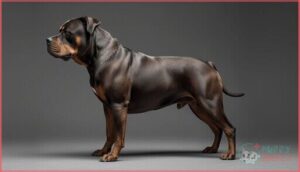This site is supported by our readers. We may earn a commission, at no cost to you, if you purchase through links.

The Rottweiler Pitbull mix inherits dense musculature, powerful jaw strength, and loyalty that borders on possessive, but these characteristics manifest differently depending on which parent breed dominates the genetic expression.
Understanding what drives this hybrid’s behavior, from exercise thresholds that prevent destructive tendencies to socialization windows that shape reactivity, determines whether you’ll raise a stable family guardian or struggle with a dog whose physical capabilities outmatch your management skills.
Table Of Contents
- Key Takeaways
- Rottweiler Pitbull Mix Traits and Appearance
- Temperament, Behavior, and Trainability
- Health, Nutrition, and Care Requirements
- Top 5 Products for Rottweiler Pitbull Mixes
- Frequently Asked Questions (FAQs)
- Is a Rottweiler Pitbull Mix a good dog?
- Is the Pitbull Rottweiler mix illegal?
- What is the personality of a pitweiler?
- What is the best Rottweiler mix?
- How much does a Rottweiler Pitbull puppy cost?
- What common colors do Rottweiler Pitbull mixes have?
- Can Rottweiler Pitbull mixes live in apartments?
- What is the average litter size for Pitweilers?
- Are Rottweiler Pitbull mixes prone to allergies?
- Are Rottweiler Pitbull mixes good with children?
- Conclusion
Key Takeaways
- Rottweiler Pitbull mixes vary drastically in size (40-100 pounds) and temperament depending on which parent breed dominates genetically, making individual assessment more reliable than breed assumptions.
- Without at least two hours of daily vigorous exercise and early socialization between weeks 3-16, these dogs redirect their high energy into destructive behaviors and develop anxiety-based reactivity in 40% of cases.
- Both parent breeds pass down serious health vulnerabilities including hip dysplasia, bloat risk in deep-chested builds, and elevated cancer rates that require proactive veterinary screening throughout their 10-14 year lifespan.
- Their protective instincts and physical strength demand experienced ownership with consistent training methods using positive reinforcement, as harsh corrections backfire with these intelligent working breeds.
Rottweiler Pitbull Mix Traits and Appearance
The Rottweiler Pitbull mix presents a distinctive combination of physical traits inherited from two powerful working breeds. Understanding what this hybrid looks like helps you recognize the breed and know what to expect as your dog matures.
Let’s examine the key physical characteristics that define this muscular crossbreed.
Rottweiler Pitbull Mix Size and Weight
Most Rottweiler Pitbull mixes tip the scales between 40 and 100 pounds, though individual dogs can fall outside this range depending on which parent they take after. Height usually sits between 18 and 25 inches at the shoulder. Genetic factors play a larger role than you might expect:
- Your pup’s adult dimensions won’t be fully evident until 12 to 18 months—the growth timeline varies considerably
- Rottweiler physical traits like bone density can push some dogs toward the upper end of ideal weight ranges
- Weight management becomes essential since breed characteristics from both parents predispose them to joint stress
Coat Types and Color Variations
The coat you’ll see on this hybrid ranges from short and sleek to occasionally double-layered, depending on how much Rottweiler genetics show through. Color inheritance follows predictable patterns, though merle variations can appear when Pitbull lineage carries that gene.
| Coat Colors | Coat Type | Grooming Needs |
|---|---|---|
| Black with tan markings | Short, single-layer | Weekly brushing |
| Brindle | Short to medium | Bi-weekly brushing |
| Brown/Chocolate | Double coat (seasonal shedding) | 2-3x weekly during shedding |
| Blue or Merle | Variable thickness | Depends on density |
Coat genetics determine texture more than appearance—double coats require increased attention during spring and fall shedding cycles.
Face, Body Shape, and Physical Build
Beyond the coat itself, you’ll notice how skull structure and muscle distribution create the hybrid’s characteristic appearance. Head proportions blend the Rottweiler’s broad skull with the Pitbull’s defined jaw musculature, while bone structure bolsters substantial weight distribution across the chest and hindquarters.
- Muscular development concentrates visibly through the shoulders, chest, and rear legs
- Facial markings may include tan eyebrow spots or cheek patches from Rottweiler genetics
- Paw size correlates directly with adult weight predictions—larger paws indicate heavier builds
- Tail carriage sits medium to low, tapering without the Rottweiler’s typical docking
Comparison to Rottweiler and Pitbull Parents
When comparing physical traits, your mix lands somewhere between its parents: lighter than most Rottweilers (80–135 lbs) but more substantial than Pitbulls (30–90 lbs). Size differences emerge from the Rottweiler’s broader frame and the Pitbull’s athletic build.
Temperament origins trace to the Rottweiler’s guarding instincts and the Pitbull’s family devotion, influencing dog behavior and dog temperament in your hybrid.
Health inheritance includes hip dysplasia risks from both breeds, while coat variations reflect the Rottweiler’s double layer versus the Pitbull’s single coat. These dogs are often referred to as Pitweilers or Rottbulls.
Breed recognition remains absent for this dog breed, unlike its purebred parents.
Temperament, Behavior, and Trainability
Your Rottweiler Pitbull mix brings together two powerful breeds with distinct behavioral patterns that shape daily life together. Understanding this hybrid’s temperament helps you build a safe, trusting relationship from day one.
Let’s examine the core traits that define how this dog thinks, acts, and learns.
Loyalty and Affection Toward Family
When you bring a Rottweiler Pitbull mix into your home, you’re not just getting a dog—you’re gaining a fiercely devoted companion who’ll consider your family their entire world.
This loyal hybrid forms profound family bonds and displays affection openly with those they trust. Their protective temperament means they’re naturally vigilant around children, though proper socialization ensures this protectiveness translates to gentle companionship rather than overguarding behavior.
Energy Levels and Exercise Needs
If you’re expecting a couch potato, think again—this powerhouse hybrid demands at least two hours of vigorous daily activity to stay physically healthy and mentally balanced. Without sufficient physical activity and mental stimulation, you’ll see destructive behaviors emerge as your dog redirects pent-up energy toward your furniture.
This powerhouse hybrid demands at least two hours of vigorous daily activity or destructive behaviors will emerge
Exercise intensity should match their athletic build—think running, fetch sessions, or scent work rather than leisurely strolls, as breed differences in energy level between Rottweilers and Pitbulls converge into consistently high demands.
Protective Instincts and Socialization
Your Rottweiler Pitbull mix carries powerful protective instincts—81% of owners report guarding behaviors at home, placing this hybrid among the top 15 breeds for territorial drive.
Early socialization during weeks 3-16 is critical; puppies meeting at least 10 new people and 5 animals show a 60% reduction in anxiety-based reactivity later. Without structured exposure, up to 40% develop resource guarding or territorial aggression by age three, making early training methods essential to shaping a stable temperament.
They can be affectionate family dogs, but socialization is key.
Trainability and Intelligence
Your Rottweiler Pitbull mix brings together two of the most trainable working breeds, with both parents ranking in the top 25% for learning speed and command retention. This breed intelligence translates to quick problem-solving and responsiveness—but it also means they’ll test boundaries without consistent training methods.
Mental stimulation prevents destructive dog behavior:
- Daily obedience drills reinforce temperament stability
- Puzzle toys challenge their working-dog minds
- Scent work utilizes natural tracking instincts
- Agility courses burn energy while building focus
- Trick training strengthens your bond and their confidence
Positive reinforcement works best; they respond poorly to harsh corrections.
Health, Nutrition, and Care Requirements
Your Rottweiler Pitbull mix needs consistent care to stay healthy and thrive. Like both parent breeds, this hybrid faces specific health risks and requires careful attention to diet, exercise, and grooming.
Here’s what you need to know to keep your dog in top condition.
Common Health Issues and Lifespan
Owning a Rottweiler Pitbull mix means preparing for a 10 to 14-year commitment where proactive health management is your first line of defense. This hybrid inherits genetic vulnerabilities from both parent breeds, making preventative care essential for canine health longevity.
Regular veterinary screenings and maintaining best weight directly influence your dog’s average lifespan and quality of life.
| Health Concern | Risk Level & Notes |
|---|---|
| Joint Problems (Hip/Elbow Dysplasia) | High risk from Rottweiler genetics; requires controlled exercise |
| Bloat Risk (Gastric Dilatation-Volvulus) | Moderate-high; deep-chested breeds need feeding management |
| Cancer Prevalence | Elevated in Rottweilers; early detection screenings important |
| Heart Conditions | Moderate; inherited from both lineages |
| Eye Issues (Entropion) | Low-moderate; common Rottweiler health problems |
Food and Dietary Needs
A Rottweiler Pitbull mix doesn’t just need fuel—it needs precisely calibrated nutrition that promotes dense muscle mass, joint integrity, and sustained energy output across a 10 to 14-year lifespan. Your dog’s diet requirements shift dramatically across life stages:
- Puppy nutrition demands controlled calcium/phosphorus ratios to prevent developmental orthopedic disease
- Calorie requirements range from 1,400-2,500 daily depending on activity level and body composition
- Senior diet formulations with glucosamine and chondroitin protect aging joints
- Food allergies (common in both parent breeds) may require novel protein sources
Supplement needs should address breed-specific vulnerabilities rather than following generic dog nutrition protocols.
Exercise and Daily Activity
Without proper physical and mental outlets, a Rottweiler Pitbull mix doesn’t just get bored—it channels that untapped drive into destructive behaviors that can dismantle your home and stress the dog’s psychological baseline. You’ll need to provide structured exercise variety that targets both physical activity and mental stimulation daily.
| Activity Type | Duration/Frequency |
|---|---|
| Leash walks | 45-60 minutes daily |
| High-intensity playtime essentials | 20-30 minutes twice daily |
| Mental stimulation (scent work, puzzle toys) | 15-20 minutes daily |
| Off-leash exercise (secure areas) | 30 minutes 3-4x weekly |
| Obedience/leash manners training | 10-15 minutes daily |
This activity intensity prevents behavioral deterioration while maintaining cardiovascular health and joint function across your dog’s lifespan.
Grooming and Maintenance Tips
Keeping your Rottweiler Pitbull mix active won’t mean much if you let its coat, nails, and ears slide into neglect—grooming isn’t optional maintenance, it’s a health protocol that directly affects skin integrity and early disease detection. You’ll need to establish a consistent pet grooming routine:
- Coat brushing: Weekly sessions reduce shedding and distribute natural oils.
- Nail trimming: Every 3-4 weeks prevents joint stress.
- Ear cleaning: Biweekly checks prevent infection.
- Dental hygiene: Daily brushing controls plaque.
- Bath frequency: Monthly or as needed maintains skin health.
Top 5 Products for Rottweiler Pitbull Mixes
Caring for a Rottweiler Pitbull mix means choosing products that support their physical strength, coat health, and dental needs. The right tools make grooming easier and help prevent common health issues down the road.
Here are five essential products that’ll keep your dog looking sharp and feeling their best.
1. Hertzko Self Cleaning Pet Brush

Managing shedding with a Rottweiler Pitbull mix requires tools designed for efficiency and pet care comfort. The Hertzko Self Cleaning Pet Brush facilitates grooming ease through its push-button retraction mechanism, which simplifies cleaning after each session.
Its angled bristles work effectively across different fur types, including the short to double-layered coats common in this hybrid. The brush’s design promotes effectiveness by detangling and removing loose hair while remaining gentle enough for skin sensitivity concerns.
At $15.99, this grooming tool aids routine dog grooming and pet grooming practices essential for maintaining your dog’s coat health and reducing household shedding.
Best For: Owners of Rottweiler Pitbull mixes or similar breeds dealing with moderate to heavy shedding who want an affordable, easy-to-clean brush that works on short to medium-length coats.
- Self-cleaning button retracts bristles for quick fur removal, saving time and reducing mess between grooming sessions
- Angled bristles effectively detangle and capture loose hair without scratching or irritating sensitive skin
- Budget-friendly at $15.99 while delivering solid performance for routine shed control and coat maintenance
- May feel too harsh for dogs with very thin coats or extra-sensitive skin, even though it’s marketed as gentle
- Effectiveness drops with very short hair types, so results can vary depending on your dog’s specific coat texture
- Requires careful brushing technique to avoid pulling on existing mats or tangles, especially in problem areas.
2. OUAI Mercer Street Dog Shampoo

After grooming comes cleansing, and the OUAI Mercer Street Dog Shampoo focuses on hydration efficacy with its blend of aloe vera, panthenol, and rambutan seed extract. These ingredient benefits work together to moisturize skin while adding shine to your dog’s coat—whether short or double-layered.
The scent composition features Italian lemon and Turkish rose, creating a lasting fragrance that aids pet care routines without overwhelming sensitivity thresholds.
At $32 for 16 ounces, its market reputation reflects premium dog grooming standards, and packaging sustainability through recycled plastic aligns with responsible dog health practices for your protective companion.
Best For: Dog owners looking for a luxury shampoo that hydrates their pet’s coat while leaving a pleasant, lasting scent reminiscent of high-end human haircare products.
- Hydrating formula with aloe vera, panthenol, and rambutan seed extract nourishes skin and adds shine to fur without stripping natural oils.
- Free from harsh chemicals like parabens, SLS, SLES, and phthalates, making it vegan, cruelty-free, and safer for dogs with sensitive skin.
- Long-lasting Mercer Street fragrance with notes of Italian lemon and Turkish rose keeps your dog smelling fresh for days without being overpowering.
- At $32 for 16 ounces, it’s significantly pricier than most standard dog shampoos on the market.
- The added fragrance may not be suitable for all dogs, particularly those with allergies or sensitivities, so consulting a vet is recommended.
- Requires thorough rinsing to prevent potential skin irritation from product buildup on the coat.
3. Coastal Pet Dog Nail Trimmer

Nail maintenance becomes simpler when you pair precision with safety. The Coastal Pet Safari Professional Dog Nail Trimmer features an ergonomic design with a non-slip, over-molded grip that reduces hand fatigue during pet care sessions.
Its stainless steel cutting mechanism employs a guillotine-style blade with a safety stop—preventing quick injury while delivering clean cuts that minimize splitting. Available in multiple size suitability options for small through large breeds, this tool accommodates your Rottweiler Pitbull mix’s thick nails.
The grooming impact includes healthier paws and improved posture when used every 7-10 days initially, moving to monthly maintenance. Consumer feedback consistently highlights durability and control, making it reliable for both novice dog owners and professional dog grooming applications.
Best For: Dog owners with small to large breeds who want a reliable, safety-focused nail trimmer that delivers precise cuts without risking injury to the quick.
- Sharp stainless steel guillotine blade with safety stop prevents accidental cuts to the quick while delivering clean cuts that reduce nail splitting
- Ergonomic non-slip grip with large finger holes reduces hand fatigue and works for both left and right-handed users
- Multiple size options available from puppies to large breeds, making it versatile for different dog sizes and nail thicknesses
- May not handle very large dogs over 20 kg effectively due to size limitations of the standard and large models
- Some users report the safety guard can feel obstructive and gets in the way during trimming
- Durability concerns with potential rusting in humid environments and inconsistent quality control reported by some customers
4. Zymox Ear Cleanser Bio-Active Enzymes

Enzyme composition drives the effectiveness of Zymox Ear Cleanser‘s proprietary LP3 system, which combines lactoperoxidase, lactoferrin, and lysozyme to disrupt biofilms without antibiotics.
Clinical efficacy studies demonstrate over 99.99% pathogen reduction against Staphylococcus aureus and Pseudomonas within minutes—critical for Rottweiler mixes prone to ear infections. The safety profile permits use in dogs of all ages with zero reported adverse effects.
Usage instructions recommend flushing the canal 1-2 times weekly for maintenance or daily during active care. Professional endorsements from veterinary clinics and TICA validate its role in dog health management.
Best For: Dog owners seeking a gentle, enzyme-based ear maintenance solution for preventing infections and wax buildup without harsh chemicals or antibiotics.
- LP3 enzyme system achieves 99.99% pathogen reduction against common ear bacteria like Staphylococcus and Pseudomonas within minutes, backed by clinical studies.
- No harsh detergents or antibiotics means zero reported adverse effects across all dog ages and breeds, including sensitive or pregnant animals.
- Easy compliance with simple flush-and-massage application 1-2 times weekly, requiring no pre-cleaning steps.
- May leave greasy residue on fur and skin around the ear area if excess solution isn’t wiped away properly.
- Not designed to treat active infections—works best for maintenance and prevention rather than therapeutic intervention.
- Some dogs with extremely sensitive ears might experience mild discomfort, though this is rare based on safety data.
5. Greenies Original Regular Dental Dog Treats

Daily dental care matters for your Rottweiler Pitbull mix, and Greenies Original Regular Dental Dog Treats deliver measurable oral health benefits through mechanical plaque removal. The chewy texture reduces plaque coverage by 12-17% and calculus by 20-35% with consistent use—essential for maintaining dog health in breeds prone to dental issues.
With 28% crude protein and highly digestible ingredients like wheat gluten and natural poultry flavor, treat nutritional value bolsters overall dog nutrition without compromising dog diet balance.
Customer recommendation rates hit 78%, reflecting strong satisfaction with dental treat efficacy and ingredient digestibility in animal health management routines.
Best For: Medium-sized dogs (25-50 lbs) needing daily dental care with a natural, vet-recommended treat that reduces plaque and freshens breath.
- Clinically proven results—reduces plaque by 12-17% and tartar by 20-35% with daily use, plus cuts bad breath compounds by 75%
- High-quality nutrition with 28% protein, natural ingredients, and complete digestibility for sensitive stomachs
- VOHC-accepted and vet-recommended brand with a 78% customer recommendation rate and strong market trust
- Higher price point compared to other dental treats, especially for multi-dog households
- May not hold up for aggressive chewers or very large dogs despite the “regular” size designation
- Daily cost adds up over time, making it a premium ongoing expense for routine dental maintenance
Frequently Asked Questions (FAQs)
Is a Rottweiler Pitbull Mix a good dog?
A Rottweiler Pitbull mix can be an excellent family companion for experienced owners who understand powerful, intelligent breeds.
These dogs need consistent training, early socialization, and firm leadership to channel their protective instincts appropriately and develop stable temperaments.
Is the Pitbull Rottweiler mix illegal?
Breed-Specific Laws vary by jurisdiction, making legality a location-dependent question rather than a universal answer.
Some municipalities restrict certain dog breeds based on public perception and insurance liability concerns, while others focus on responsible ownership regardless of breed.
What is the personality of a pitweiler?
Pitweilers display strong protective instincts and loyalty toward their family, making them devoted companions. Their intelligence allows quick learning, though dominance tendencies require firm training.
Early socialization reduces stranger danger and improves child compatibility while managing separation anxiety.
What is the best Rottweiler mix?
Like choosing the right tool for a skilled job, the “best” Rottweiler mix depends on your lifestyle and experience. The Rottweiler Pitbull mix offers remarkable loyalty and trainability, though activity levels demand commitment.
Mix breed health, temperament, and grooming needs vary across dog breeds, making careful assessment essential for successful dog care.
How much does a Rottweiler Pitbull puppy cost?
Puppies from reputable breeders usually cost $500 to $1,500, depending on breeder reputation and puppy bloodlines. Location impact and initial supplies add to long-term costs, while adoption fees generally stay under $
What common colors do Rottweiler Pitbull mixes have?
Coat color genetics work like mixing paint on a palette—endless combinations emerge from parent breeds. You’ll often see black, brown, brindle, blue, and merle variations in this hybrid, reflecting Rottweiler characteristics and Pitbull breed traits.
These color variations also influence temperament through color-health links.
Can Rottweiler Pitbull mixes live in apartments?
While possible, apartment living isn’t ideal without meeting specific conditions. You’ll need sufficient space for exercise alternatives like indoor fetch, plus tolerant neighbors given potential noise levels.
Check landlord policies carefully, as dog breeds with protective temperaments often face restrictions.
Prioritize early socialization needs and commit to rigorous daily dog exercise routines.
What is the average litter size for Pitweilers?
Usually, a healthy female produces five to eight puppies per breeding cycle. First-time mothers may deliver smaller litters due to reproductive maturity factors.
Genetics and overall health greatly influence puppy survival rates and litter size variations across different dog breeds.
Are Rottweiler Pitbull mixes prone to allergies?
Yes, both parent dog breeds can pass down susceptibility to skin allergies, food sensitivities, and environmental allergens.
Watch for allergy symptoms like itching or digestive issues, and consult your vet for proper allergy treatment options.
Are Rottweiler Pitbull mixes good with children?
When properly socialized from puppyhood, Rottweiler Pitbull mixes can become excellent family dogs around children.
Supervised interaction remains essential due to their size and protective instincts.
Training greatly impacts child safety and temperament expression in family environments.
Conclusion
Raising a Rottweiler Pitbull mix is like holding a leash attached to both a loaded spring and a loyal sentinel—the outcome depends entirely on how you channel that energy.
This hybrid demands structured socialization windows, consistent exercise thresholds exceeding 90 minutes daily, and training that respects its intelligence without triggering defensive instincts.
Your preparation determines whether this breed’s protective drive becomes an asset or liability, transforming genetic potential into a stable companion rather than a management challenge you can’t sustain.
- https://www.apps.akc.org/apps/store/search/dog_lookup.cfm?returnpage=undefined&_=2770
- https://ofa.org/juvenile-laryngeal-paralysis-polyneuropathy/
- https://us.working-dog.com/dogs-details/5164702/Zamp-vom-Vilstaler-Land
- http://www.akc.org/dog-breeds/rottweiler/
- https://www.acvs.org/small-animal/osteochondrosis-of-the-shoulder/












